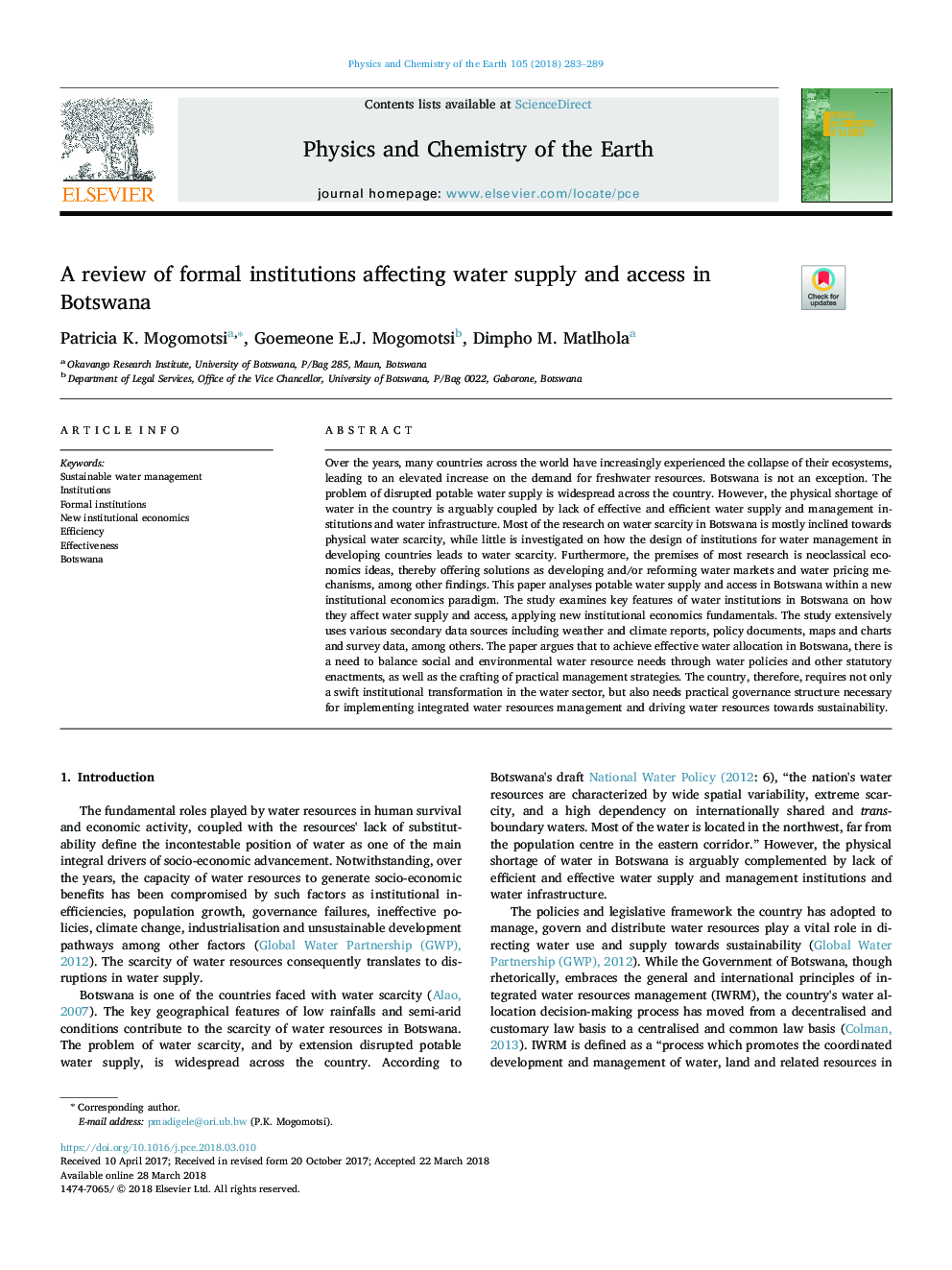| کد مقاله | کد نشریه | سال انتشار | مقاله انگلیسی | نسخه تمام متن |
|---|---|---|---|---|
| 8912372 | 1639333 | 2018 | 7 صفحه PDF | دانلود رایگان |
عنوان انگلیسی مقاله ISI
A review of formal institutions affecting water supply and access in Botswana
ترجمه فارسی عنوان
بررسی نهادهای رسمی تأثیرگذار بر تامین آب و دسترسی در بوتسوانا
دانلود مقاله + سفارش ترجمه
دانلود مقاله ISI انگلیسی
رایگان برای ایرانیان
کلمات کلیدی
مدیریت آب پایدار، موسسات، موسسات رسمی، اقتصاد نهادی جدید، بهره وری، اثربخشی، بوتسوانا،
ترجمه چکیده
در طول سال ها، بسیاری از کشورها در سراسر جهان به طور فزاینده ای سقوط اکوسیستم های خود را تجربه کرده اند، که منجر به افزایش شدید تقاضا برای منابع آب شیرین شده است. بوتسوانا یک استثنا نیست مشکل آب آشامیدنی قطع شده در سراسر کشور گسترده است. با این حال، کمبود فیزیکی آب در کشور، مسلما ناشی از فقدان مؤسسات تامین و مدیریت موثر و کارآمد و زیرساخت های آب است. اکثر تحقیقات در مورد کمبود آب در بوتسوانا عمدتا به کمبود آب آشامیدنی کمک می کنند، در حالیکه کمی درباره نحوه طراحی موسسات مدیریت آب در کشورهای در حال توسعه به کمبود آب منجر شده است. علاوه بر این، زمینه بیشتر پژوهش ها، ایده های اقتصادی نئوکلاسیک است، به این ترتیب راه حل هایی برای توسعه و یا اصلاح بازار آب و مکانیزم های قیمت گذاری آب در میان سایر یافته ها ارائه می شود. در این مقاله، آبزیان و دسترسی به آب آشامیدنی در بوتسوانا در یک پارادایم اقتصادی جدید نهادی بررسی شده است. این مطالعه به بررسی ویژگی های کلیدی نهادهای آب در بوتسوانا در مورد چگونگی تأثیر آب و دسترسی به آنها و استفاده از اصول پایه اقتصادی نوین می پردازد. این مطالعه با استفاده از منابع مختلف ثانویه اطلاعاتی از جمله گزارش های آب و هوا، آب و هوا، اسناد سیاست، نقشه ها و نمودارها و داده های نظرسنجی، از جمله دیگر استفاده می کند. این مقاله استدلال می کند که برای رسیدن به تأمین آب مناسب در بوتسوانا نیاز به تعادل نیازهای منابع آب و فاضلاب اجتماعی و محیطی از طریق سیاست های آب و سایر قوانین قانونی و همچنین ایجاد راهکارهای مدیریت عملی وجود دارد. بنابراین، کشور نیازمند نه تنها یک تغییر اساسی سریع در بخش آب، بلکه نیاز به ساختار حاکمیت عملی لازم برای اجرای یکپارچه مدیریت منابع آب و رانندگی منابع آب در جهت پایداری دارد.
موضوعات مرتبط
مهندسی و علوم پایه
علوم زمین و سیارات
ژئوشیمی و پترولوژی
چکیده انگلیسی
Over the years, many countries across the world have increasingly experienced the collapse of their ecosystems, leading to an elevated increase on the demand for freshwater resources. Botswana is not an exception. The problem of disrupted potable water supply is widespread across the country. However, the physical shortage of water in the country is arguably coupled by lack of effective and efficient water supply and management institutions and water infrastructure. Most of the research on water scarcity in Botswana is mostly inclined towards physical water scarcity, while little is investigated on how the design of institutions for water management in developing countries leads to water scarcity. Furthermore, the premises of most research is neoclassical economics ideas, thereby offering solutions as developing and/or reforming water markets and water pricing mechanisms, among other findings. This paper analyses potable water supply and access in Botswana within a new institutional economics paradigm. The study examines key features of water institutions in Botswana on how they affect water supply and access, applying new institutional economics fundamentals. The study extensively uses various secondary data sources including weather and climate reports, policy documents, maps and charts and survey data, among others. The paper argues that to achieve effective water allocation in Botswana, there is a need to balance social and environmental water resource needs through water policies and other statutory enactments, as well as the crafting of practical management strategies. The country, therefore, requires not only a swift institutional transformation in the water sector, but also needs practical governance structure necessary for implementing integrated water resources management and driving water resources towards sustainability.
ناشر
Database: Elsevier - ScienceDirect (ساینس دایرکت)
Journal: Physics and Chemistry of the Earth, Parts A/B/C - Volume 105, June 2018, Pages 283-289
Journal: Physics and Chemistry of the Earth, Parts A/B/C - Volume 105, June 2018, Pages 283-289
نویسندگان
Patricia K. Mogomotsi, Goemeone E.J. Mogomotsi, Dimpho M. Matlhola,
